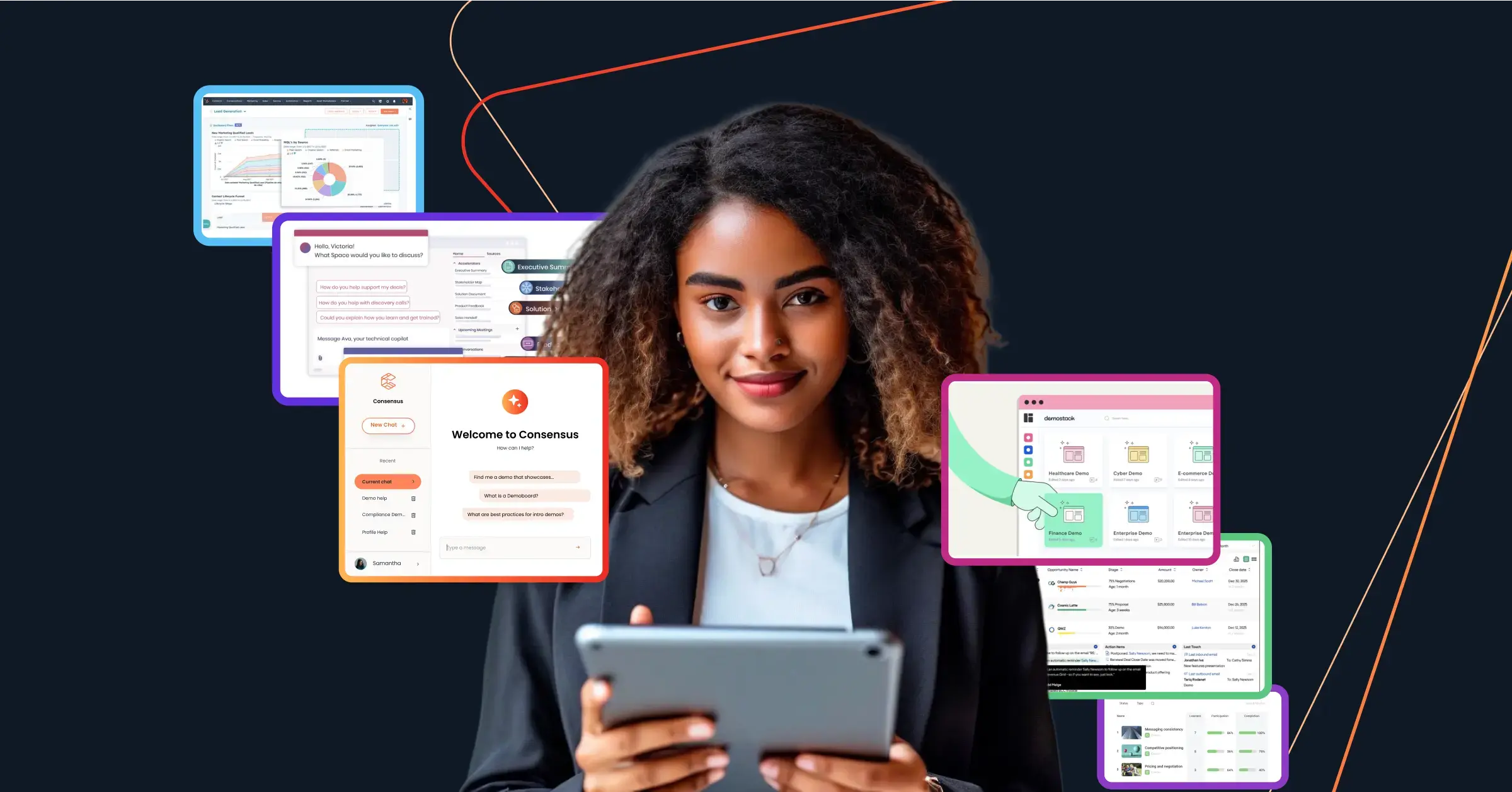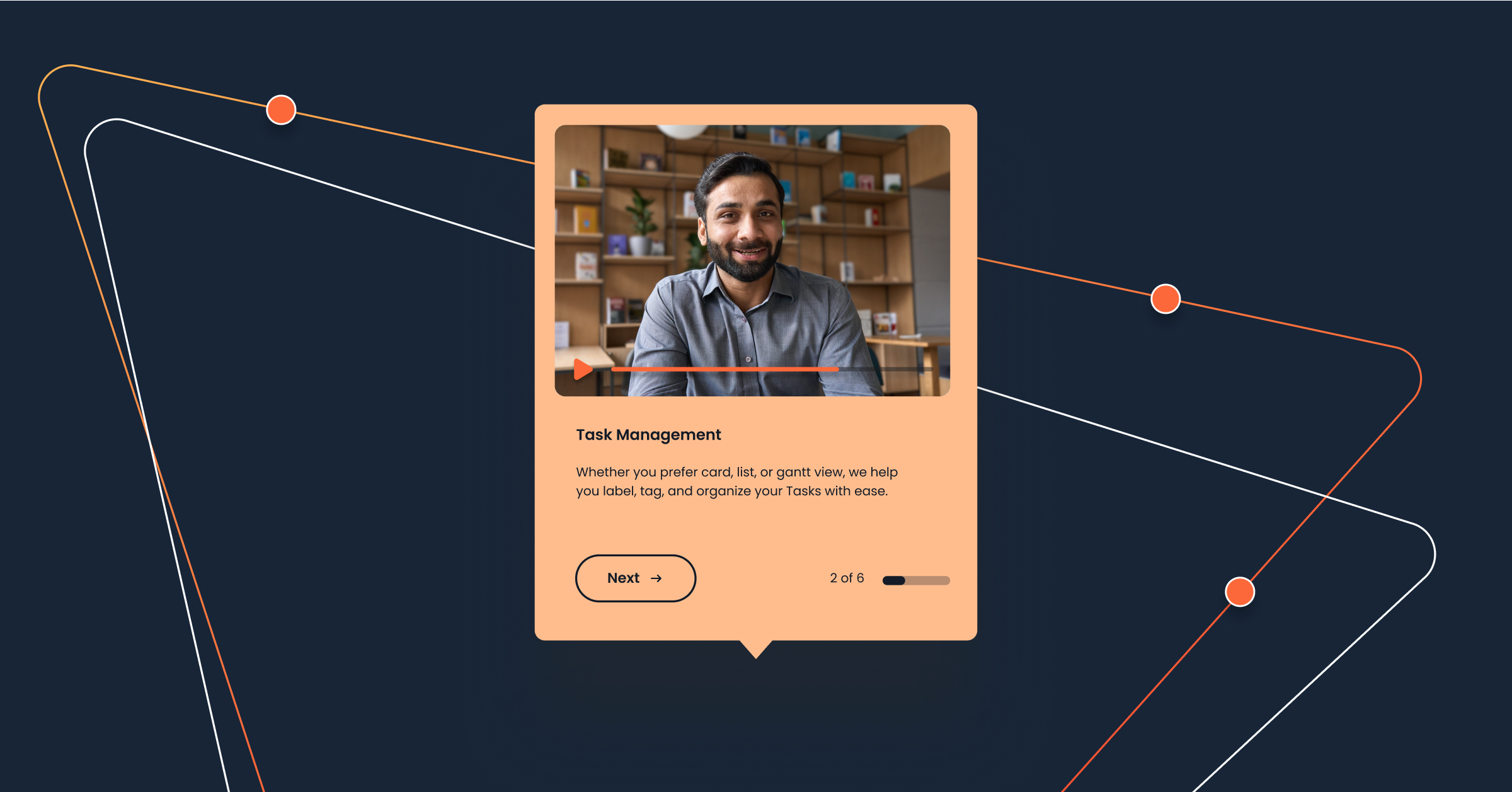Close more deals with
Demo Automation.
Watch a Demo
Picture this: Your sales team is on the brink of closing a major deal, but the prospect wants to see your product in action before signing.
Then, the demo gets scheduled two weeks out because your presales team is swamped with requests. By then, your competitor has swooped in with an instant demo experience, and your hot lead has gone cold.
The presales function has evolved from simple product demonstrations to a strategic revenue driver that can make or break complex B2B deals. In this guide, we’ll explore some of the presales software tools that are transforming how revenue teams showcase products, engage prospects, and close deals faster.
What is Presales Software?
Presales software refers to specialized tools designed to support technical sales teams during the critical stages before closing a deal. These platforms help sales engineers and solution consultants create compelling product demonstrations, manage technical evaluations, and effectively communicate complex value propositions to potential customers. Modern presales software has become essential for revenue teams looking to accelerate sales cycles and improve win rates in competitive markets.
Today’s presales professionals aren’t just demo builders—they’re trusted technical advisors who guide complex buying committees toward confident purchase decisions.
The challenge? Most presales teams are dramatically outnumbered. Our 2025 Sales Engineering Compensation and Benchmark Report found that the typical ratio of sales engineers to account executives is 1:5. With each SE supporting multiple AEs across numerous deals, the traditional approach of custom demos and live presentations simply doesn’t scale.
That’s where modern presales software comes in. These solutions now incorporate AI-driven insights, interactive product experiences, and deep analytics that help revenue teams understand buyer behavior and preferences. With B2B buying decisions increasingly happening outside of sales meetings, presales software has become essential for engaging prospects when sales representatives aren’t present.
Key benefits of presales software include:
- Streamlined workflows: Automates repetitive tasks and standardizes presales processes
- Enhanced buyer experiences: Delivers personalized, self-service product demonstrations
- Shortened sales cycles: Reduces time between initial contact and closed deals
- Improved conversion rates: Increases win rates through better qualification and engagement
- Valuable analytics: Provides insights into prospect behavior and preferences
The presales landscape has transformed dramatically in recent years as B2B buying committees have grown larger and more complex. Today’s buyers expect self-service options, personalized experiences, and immediate access to product information – making dedicated presales software essential for modern revenue teams.
Types of Presale Software
Presales software encompasses several distinct categories, each addressing specific challenges in the technical sales process. Understanding these categories helps organizations build a comprehensive presales tech stack that supports their unique sales motion.
Other important categories include:
- Product Experience Platforms: These solutions enable teams to create interactive, personalized product demonstrations that buyers can explore on their own terms. Product experience platforms like Consensus help prospects understand product value through guided, self-service experiences that can be accessed 24/7.
- Buyer Enablement Software: These tools empower prospects with self-service resources and information to make purchasing decisions more efficiently. They provide educational content, interactive guides, and personalized recommendations that help buyers navigate complex purchasing decisions.
- Presales Management: These platforms coordinate presales activities, track team performance, and manage critical resources such as solution engineers and demo requests. They typically include scheduling, workload balancing, project tracking, and analytics, enabling leaders to optimize resource allocation, reduce burnout, and ensure the right expertise is available for every opportunity.
- Revenue Intelligence Tools: Revenue intelligence tools analyze customer interactions, deal progression, and engagement data across calls, emails, demos, and meetings. These platforms—often powered by AI—uncover actionable insights about buyer intent, pipeline health, and deal risks, helping teams prioritize the right opportunities and refine sales strategies for maximum impact.
- Product Demo Platforms: Purpose-built for creating, customizing, and sharing compelling product demonstrations, these tools help technical sellers deliver engaging experiences—whether live, recorded, or interactive. Advanced platforms (like Consensus) enable scalability through automation, ensuring every stakeholder receives a consistent, tailored demo experience.
- Sales Environments: These are controlled digital spaces where prospects can safely interact with product features, run test scenarios, or explore sandboxes without impacting production environments. Sales environments help technical buyers evaluate real-world use cases, prove product fit, and build confidence in complex solutions—often a key requirement for enterprise deals.
Many modern presales solutions offer capabilities across multiple categories, creating comprehensive platforms that support the entire technical sales process. The most effective presales tech stacks typically combine tools from different categories to address specific team needs and sales motions.
The Best Presales Software For Demo Creation and Product Experience Management
Demo creation and product experience management tools form the foundation of effective presales strategies. These solutions help revenue teams create compelling product demonstrations that prospects can access on their own terms, dramatically reducing demo lag time and accelerating sales cycles. Effective presales demos powered by specialized software help meet these expectations while providing valuable insights into buyer behavior.
1. Consensus

Consensus is the first comprehensive Product Experience Platform designed to help revenue teams create educational, inspiring, and truly engaging product demonstrations. The platform combines demo automation technology with industry-leading insights and AI assistance to help teams close deals faster by delivering personalized product experiences that modern buyers demand.
Key features:
- On-Demand Video Demos: Personalized video demos that address specific use cases and pain points based on buyer preferences
- Interactive Product Tours: Guided experiences that let buyers view and try products in controlled, contextualized environments
- Automated Product Simulations: One-click sandbox demo experiences that provide data-rich POC experiences without engineering support
- DemoBoards: Secure, branded landing pages where buying groups can explore and share product experiences
- Stakeholder Discovery: Tools that help identify and engage all decision-makers in complex buying committees
- CRM Integration: Seamless connections with major CRM platforms for streamlined workflow
- Actionable Intent Data: Analytics that reveal buyer preferences, feature rankings, and organizational heat maps
- AI-Assisted Demo Creation: Intelligent tools that help build compelling product demonstrations quickly

Pros:
- Reduces sales cycles through automated demos and stakeholder discovery
- Increases deal sizes by uncovering additional stakeholders and use cases
- Provides valuable intent data that helps prioritize opportunities and personalize follow-up
- Enables 24/7 selling with self-service product experiences
- Scales presales resources efficiently without adding headcount
- Supports the entire buyer journey from initial interest to purchase decision
- Works for both sales and marketing teams to generate and nurture leads
Cons:
- Premium pricing may not fit smaller team budgets
- Requires initial setup and content creation
- Learning curve for advanced features
Pricing:
- Starter: $600/month
- Pro: $1250/month
- Enterprise: Consensus offers custom pricing tailored to your team’s size and needs. Contact Consensus to request a personalized quote.
2. Testbox

Testbox creates customized sandboxes that allow prospects to explore products in controlled environments with realistic data. This solution is particularly valuable for complex technical evaluations and proof of concept (POC) scenarios where prospects need hands-on experience with the product.
Key features:
- Customizable Sandboxes: Realistic product environments populated with synthetic data
- Prospect Analytics: Detailed insights into how prospects interact with sandbox environments
- Data Generation and Integration: Replicate customer use cases with AI-generated datasets in product demos.
- Data Templates: Customize data templates for specific products or personas.

Pros:
- Creates authentic-feeling product environments for evaluation
- Provides detailed analytics on prospect engagement
- Reduces technical resource requirements for demonstrations
- Supports complex evaluation scenarios with multiple stakeholders
- Eliminates the need for engineering support during sales cycles
Cons:
- Implementation can be lengthy for complex products
- Browser compatibility limitations may affect some users
- Potential performance issues with particularly complex products
- Higher price point than some alternatives
Pricing:
- Startup: $44,750/year for 15 users
- Growth: $59,500/year for 15 users
- Enterprise: Custom pricing based on specific requirements
3. Demostack

Demostack allows sales teams to create interactive product replicas that look and feel like the real product but are fully controlled environments. This eliminates technical issues during demonstrations and ensures consistent messaging across the sales organization.
Key features:
- Cloud-Based Recording: Technology that captures product interfaces and interactions
- UI Replication: Tools that recreate product experiences with high fidelity
- Overlay: Mask existing demos with a narrative focused on a buyer
- AI Data Generator: Populate and edit demos with user data-supported AI.

Pros:
- Creates highly accurate product replicas for demonstrations
- Supports customization for different prospect needs and use cases
- Reduces reliance on development resources
Cons:
- Requires ongoing maintenance to stay current with product updates
- Limited customization options for highly complex scenarios
- Significant implementation investment required
- Higher price point than some alternatives
Pricing:
- Standard: $55,000
- Plus: $75,000
- Pro: $100,000
- Platinum: $150,000
The Best Presales Software For Sales and Revenue Intelligence
Sales efficiency depends on having the right information at the right time to make strategic decisions. Sales and revenue intelligence tools enhance the presales process by providing data-driven insights about prospect behavior and engagement. These solutions help teams prioritize opportunities, optimize their approach, and focus resources where they’ll have the greatest impact.
1. Gong

Gong analyzes customer interactions across calls, emails, and meetings to provide actionable insights for sales teams. The platform uses AI to identify patterns in successful deals and highlight areas for improvement in sales conversations.
Key features:
- Conversation Intelligence: Analysis of sales calls and meetings to identify effective techniques
- Deal Intelligence: Insights into deal progress and potential risks
- People Intelligence: Understanding of how different team members perform
- Market Intelligence: Trends and patterns across the entire sales organization
- AI-Powered Analysis: Machine learning that identifies successful patterns and behaviors

Pros:
- Provides data-driven insights for coaching and improvement
- Identifies successful sales patterns that can be replicated
- Facilitates knowledge sharing across sales teams
- Offers a comprehensive view of customer interactions
- Helps identify at-risk deals before they stall
Cons:
- Requires a culture comfortable with call recording and analysis
- Generates large amounts of data that must be managed effectively
- Potential privacy concerns with recording customer conversations
- Learning curve for full utilization of insights
Pricing: Custom pricing based on team size and features needed.
2. Revenue Grid

Revenue Grid helps teams identify risks, track opportunities, and optimize the sales process through AI-powered insights and automation. The platform enhances CRM data with actionable intelligence that improves sales funnel optimization and forecasting accuracy.
Key features:
- Guided Selling: Workflows that lead teams through optimal sales processes
- Revenue Signals: Alerts and notifications about important deal developments
- Pipeline Visibility: Tools for tracking opportunity progress and health
- AI-Powered Forecasting: Predictive analytics for revenue projections
- CRM Enhancement: Features that improve data quality and utilization

Pros:
- Provides actionable insights for sales teams
- Integrates seamlessly with CRM systems
- Offers AI-powered forecasting capabilities
- Identifies at-risk deals early in the process
- Improves overall sales efficiency and effectiveness
Cons:
- Requires significant setup for maximum value
- Can generate overwhelming amounts of data without proper management
- Learning curve for new users to fully utilize all features
- Premium pricing structure may not fit all budgets
Pricing: Custom pricing based on organization size and specific needs.
3. Clari

Clari provides visibility into the sales pipeline and helps forecast revenue more accurately through AI-powered analytics. The platform connects activity data with opportunity information to create a complete picture of deal health and progress.
Key features:
- Revenue Forecasting: Tools for predicting future sales with greater accuracy
- Pipeline Management: Features for tracking and optimizing opportunity flow
- Activity Intelligence: Analysis of sales team actions and customer responses
- Opportunity Management: Tools for tracking individual deal progress
- Revenue Analytics: Comprehensive reporting on sales performance

Pros:
- Improves forecast accuracy significantly
- Provides clear visibility into pipeline health
- Identifies at-risk opportunities before they stall
- Streamlines revenue operations across teams
- Connects activity data with revenue outcomes
Cons:
- Complex implementation process requires dedicated resources
- Requires consistent data input for maximum effectiveness
- Premium pricing structure may not suit smaller organizations
- Significant change management needed for full adoption
Pricing: Custom enterprise pricing based on organization size and specific requirements.
The Best Tools For Presales Management
Presales management software helps coordinate technical sales activities, manage resources effectively, and track team performance. These solutions are becoming increasingly important as organizations scale their presales function and seek to demonstrate its impact on revenue.
1. Vivun

Vivun is an AI-powered presales management platform built specifically for technical sales teams. The platform helps manage presales resources, track activities, and demonstrate the strategic impact of presales on revenue. Presales is transforming sales, and Vivun provides the tools needed to manage this evolution effectively.
Key features:
- Hero Score™: Proprietary algorithm for opportunity assessment and prioritization
- Capacity Planning: Tools for resource allocation and workload management
- Product Gap Intelligence: System for tracking and prioritizing feature requests
- Buyer Intent Signals: Insights into prospect engagement and interest
- Salesforce Integration: Seamless connection with CRM data and workflows

Pros:
- Provides holistic view of presales impact on revenue
- Strong AI capabilities deliver actionable insights
- Improves alignment between sales and presales teams
- Helps demonstrate presales ROI to executive leadership
- Purpose-built for technical sales organizations
Cons:
- Requires significant change management for full adoption
- AI insights need time to develop and mature
- Higher price point than some alternatives
- Complex implementation process
Pricing: Custom pricing based on edition, number of users, and contract terms.
2. Hubspot

Hubspot offers a comprehensive CRM platform that can be adapted for presales management with its robust feature set and customization options. While not specifically built for presales, its flexibility makes it suitable for many technical sales teams.
Key features:
- Contact and Deal Management: Tools for tracking prospects and opportunities
- Meeting Scheduling: Features for coordinating demos and technical discussions
- Email Tracking: Insights into prospect engagement with communications
- Document Management: System for organizing and sharing sales materials
- Reporting and Analytics: Comprehensive performance measurement tools

Pros:
- All-in-one platform for sales and marketing activities
- User-friendly interface requires minimal training
- Extensive integration ecosystem connects with many tools
- Scalable for growing teams with changing needs
- Strong customer support and educational resources
Cons:
- Not specifically designed for presales workflows
- Requires customization for technical sales processes
- Can become expensive as you add features and users
- Limited advanced presales analytics capabilities
Pricing:
- Professional: $800/month
- Enterprise: $3,600/month
The Best Presales Software Tools For Sales Enablement
Sales enablement tools support revenue teams by ensuring consistent messaging and providing easy access to sales resources. These solutions help presales professionals communicate value propositions effectively and access the right content at the right time during the sales process.
Effective sales enablement is particularly important for technical products where messaging must be both accurate and compelling. These tools help aspiring sales engineers and presales teams develop their skills and ensure consistent delivery across the organization.
1. Highspot

Highspot is a comprehensive sales enablement platform that helps teams organize, find, share, and analyze content throughout the sales process. The platform supports sales engineers by providing easy access to technical content and guided selling workflows.
Key features:
- Content Management: Centralized repository for sales and technical materials
- Guided Selling: Prescriptive workflows for different selling scenarios
- Training and Coaching: Tools for developing sales and presales skills
- Analytics and Reporting: Insights into content effectiveness and usage
- CRM Integration: Seamless connection with existing sales systems

Pros:
- Comprehensive sales enablement solution with robust features
- Intuitive content management makes finding materials easy
- Strong analytics capabilities show what content drives results
- Robust integration options with existing sales tools
- Supports both sales and presales teams effectively
Cons:
- Complex implementation process requires dedicated resources
- Significant investment required for full platform capabilities
- Learning curve for utilizing all available features
- May have more functionality than smaller teams need
Pricing: Custom enterprise pricing based on organization size and specific needs.
2. Seismic

Seismic helps teams create, manage, and distribute content to drive more effective buyer interactions throughout the sales process. The platform provides powerful personalization capabilities that help technical content resonate with different stakeholder groups.
Key features:
- Content Management System: Centralized repository for sales materials
- Personalization Tools: Features for customizing content for specific audiences
- Analytics and Insights: Data on content effectiveness and engagement
- Integration Capabilities: Connections with CRM and marketing automation
- Learning and Coaching: Resources for skill development and improvement

Pros:
- Comprehensive platform for content management and distribution
- Strong integration with existing systems and workflows
- Advanced analytics for measuring content effectiveness
- Supports global sales organizations with complex needs
- Robust personalization capabilities for different audiences
Cons:
- Steeper learning curve than some alternatives
- Non-intuitive interface in some areas of the platform
- Premium pricing structure may not fit smaller teams
- Complex implementation requires dedicated resources
Pricing: Custom pricing based on organization size and specific requirements.
3. Mindtickle

Mindtickle takes an individualized approach to sales training and coaching, creating custom learning paths. It also offers content management, sales and sales enablement analytics, and conversation tracking.
Features:
- Sales Readiness Index: Identify an Ideal Rep Profile to measure rep preparedness.
- Mindtickle Copilot: Use AI to roleplay with buyers, automate manual tasks, and plan training exercises.
- Digital Sales Rooms: Connect with buyers in one customized place.
- CMS: Manage all content in one place.
- Analytics: Build custom dashboards and track revenue, seller training, and buyer engagement.

Pros:
- Functions as both a CMS and a learning management system (LMS)
- Provides analytics with AI-driven insights
- Uses gamification to make sales learning more engaging
Cons:
- Non-intuitive interface
- Steep learning curve
- Time-consuming training courses
Pricing: Mindtickle doesn’t publicly display pricing.
Choose The Right Presales Software For Your Revenue Team
Selecting the right presales software requires careful consideration of your team’s specific needs and challenges. The best solution often combines tools from different categories to create a comprehensive presales tech stack that supports your unique sales motion.
Are your SEs spending too much time on unqualified demos? Are technical evaluations taking too long? Is knowledge sharing inconsistent across the team? The right presales software addresses your particular pain points rather than offering impressive but unnecessary capabilities.
If you’re serious about maximizing presales efficiency, consider Consensus’ Product Experience Platform. Consensus automates repetitive demo tasks, helps your SEs focus on high-value opportunities, and empowers buyers to self-educate at their own pace—all while giving you data-rich insights into what matters most to every stakeholder.
Consensus gives your buyers the tailored, product-led buying experience they want while optimizing and empowering your presales team to be more effective. Organizations can:
- Increase presales capacity by 30% or more
- Reduce unqualified demos up to 90%
- Increase SE specialization by 2X
- Shorten sales cycles by 30%
Explore Consensus for presales
FAQs about Presales Software





